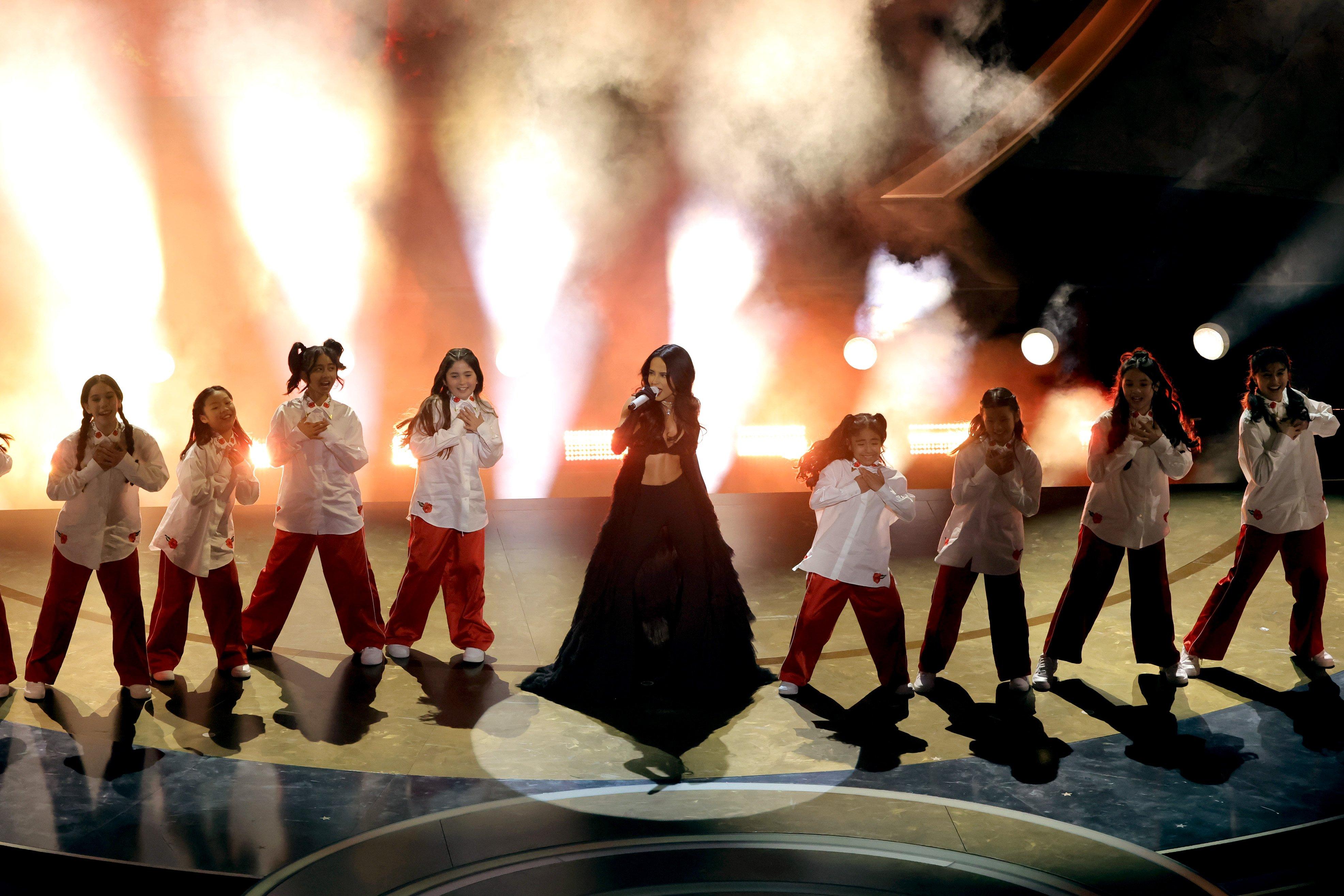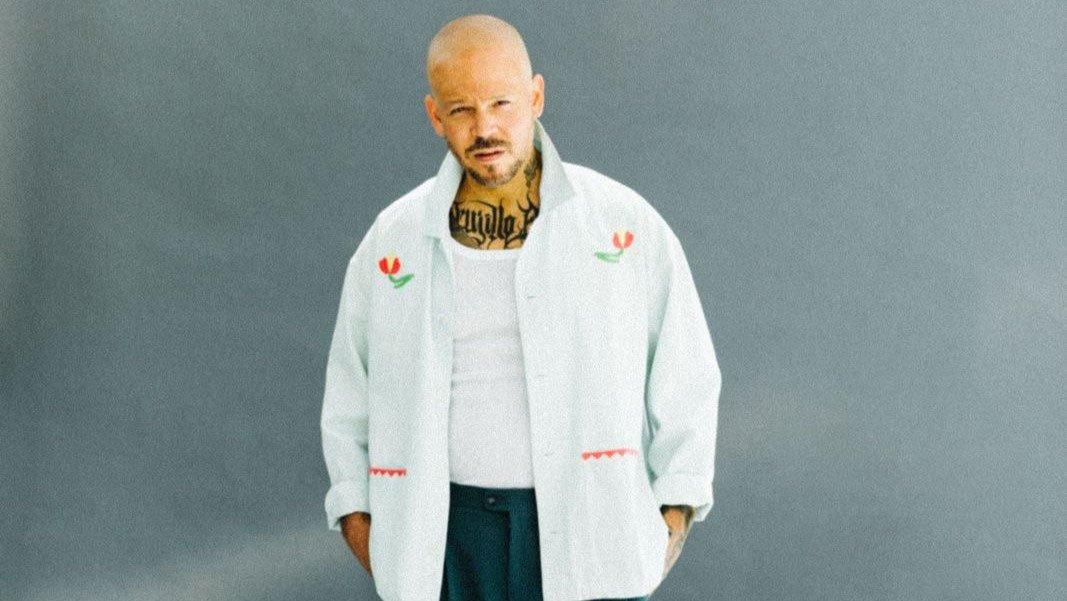Puerto Rican rapper Residente wants to embark on new adventures.
The artist born René Pérez Joglar has dreams of directing movies and acting, writing books, and making for pleasure — not to pay the bills. These goals reflect a new attitude, one resulting from time spent reflecting on the passage of time and the presence of death.
Residente's sophomore album, Las Letras Ya No Importan (Lyrics No Longer Matter), echoes this transitory period. An extensive body of work, featuring 23 tracks, with several songs surpassing the five-minute mark. Las Letras is an act of deeply intimate rebellion.
"It’s a very personal album, and I sought to connect with myself in many moments throughout," Residente tells GRAMMY.com.
While Las Letras explores topics already a hallmark of his music — the music industry, political systems, Puerto Rico — it's also exceedingly vulnerable. The 28-time Latin GRAMMY and four-time GRAMMY winner opens up about depression and personal relationships, and confronts mortality.
Lead single "313" is inspired by Residente's late friend Valentina, whose voice appears in the first interlude. As Residente recounted to El País of Spain and GQ Spain, Valentina was a violist, and the last messages they exchanged on WhatsApp were at 3:13.
The song begins with a French verse, fulfilling Valentina’s wish, expressed in the first interlude, to do something in that language. "Les paroles n'ont pas d'importance," (words no longer matter), a female voice whispers, followed by a spectacular string arrangement.
Residente revisited older works during this period of creative transition, and the record features previously released tracks "René," "This Is America," and "Quiero Ser Baladista."
Las Letras Ya No Importan features many collaborations, with actress Penélope Cruz, Spanish singer Silvia Pérez Cruz, Rauw Alejandro, Ricky Martin, Christian Nodal, Arcángel, Jessie Reyez and others making appearances. Hip-hop icon Busta Rhymes is featured on "Cerebro," while Big Daddy Kane makes an appearance on "Estilo Libre" with Vico C.
GRAMMY.com spoke with Residente via Zoom about the process that led him to his second album, the symbolism behind "313" and the artistic connection to Spain.
This interview has been edited for length and clarity.
What inspired you to create Las Letras Ya No Importan?
It’s an album that marks a musical transition for what’s coming for me. It feels diverse; it also has songs with which I may not feel as connected [to] now because several years have passed since I made them. There are newer songs with which I do connect, which have a bit more to do with the way I want to start working on my music in the future.
"René" is part of this album, even though it came out four years ago. This is an album I was going to release during the pandemic.
We have "René," which is very personal; we have "313," which I also feel is personal; then "Ron en el piso," [a song about the passage] of time, the collaboration with Nodal ("Pólvora de Ayer") also touches on the theme of time, of enjoying everything.
You confront death in several songs. In "René," you sang about losing a friend; in "Ron en el piso," you see your funeral; and in "313," you draw inspiration from your late friend Valentina. What is it about death that inspires you?
It’s something I’ve been going through in recent years. I lost many people I love, and it made me much more reflective when it comes to understanding time, the things I want to do, and the things I’ve stopped doing.
That’s why I’m also transitioning to cinema. I’ve always wanted to make films, directing, being behind the scenes, not being on stage. I’m crazy about dedicating myself entirely to that.
I discovered acting now in a movie I starred in [In the Summers] that won the Jury Award at Sundance. When I saw it, I didn’t know I was the protagonist until I watched it. [The film] encouraged me to follow that too, and I’m going to want to act, direct; I want to dedicate myself to that for a while fully.
The album has a lot of life, and even though the lyrics no longer matter, you still have much to tell. You already said the album is very personal, but how would you describe it?
I can describe it in two years, not right now. It’s transitional. That’s what happened with Calle 13; everything was a musical and lyrical change from the second album onwards.
Residente represented a fusion of world music and rap. Now, in this one, I’m using a lot of strings, cellos, and double bass. I’m going to experiment a lot with different instruments in different ways. I’m going to be creative without the need to balance the album.
What’s coming next doesn’t have that artistic pressure. The only artistic pressure I want to have is to do the highest I can, which happens organically, not feeling pressured but naturally.
I want to do art as I did in college [at Savannah College of Art and Design]. I was never thinking about people or trying to convince anyone, and I was completely free, and that’s what happened with "313." I had the freedom I always wanted to have.
There’s substantial symbolism in "313," from the faceless dancers, the color pink. What was your vision with the visuals?
The dancers represent time. Penélope [Cruz] can represent many things, from life to Valentina, my friend, who inspired me to make the song. Penélope controls me, holds me, flies me, brings me back, and then I decide to control my life and time. That’s why I raise my hands, and everyone raises them, and time is running out, and then you see a sunset.
Sunset marks the end of something. The colors of the costumes also have some dusk elements. You can see at the end when I’m disappearing; it fades and blends with the end of the sunset.
These are decisions I make that are both aesthetic and technical. I put masks on the dancers because I liked it aesthetically. It also helped me speed up the process with makeup. I had to find creative ways to maintain the video’s aesthetics and make everything more agile because in filming, everything is time, and I had little of it.
What’s the idea behind the song "Las Letras Ya No Importan?"The arrangement is magical, with a numerical sequence from one to eight in different languages and a voice spelling of the alphabet.
That was the initial track. Before "313," I had this idea that I dreamed of with some basic notes, and it turned into something big.
There’s a voiceover of Penélope [Cruz] that says that we were eight [people in the studio], we are on an 8th street in New York, in studio B, which, if you look at it, it resembles the number 8. Everything connected with eight and [that number] also at a time level can mark infinity. So, I connected all that with the immensity of letters and languages. That piece’s runtime is five minutes. I think it’s pleasurable. I like that music, which resembles what I want to do.
Leo Genovese, an excellent musician and musical genius, made the arrangements. I greatly respect him.
In "Cerebro," you showcase your skill and vocal speed; what was it like collaborating with Busta Rhymes, whose own flow is iconic?
We met, and he loved the concept of what I was working on. He was a very humble, good person to me. After we met in person and talked for a while, he went to write after I sent him everything I had written in English.
I created ["Cerebro"] a while ago…. That’s why I tell you that the album has several concepts that I had to let go of because it was too much, and a lot of time had passed. I had a previous concept when I released the song "René" [in 2020], which is why it’s on the album. [At that time] I was working with the brain waves of different animals and people, and I made music with those brain waves.
This song ["Cerebro"] is part of that, and that’s why it’s called "Cerebro." The album was originally going to go that route. Then I didn’t do it; maybe I’ll connect to it in the future because I loved that idea.
What has Spain meant to you? The country has been so prominent in the trailers you’ve released and in the collaborations in your latest songs.
I've been making frequent trips to Madrid. This past year, I was there a lot; I was more in Madrid than at home. I traveled, wrote, and filmed videos like "Problema cabrón" and "313."
I grew up with Spanish cinema by Almodovar and a bunch of directors I admire, and I wanted to collaborate with the actors I grew up watching in movies.
This album has many personal elements, and cinema is very intimate for me. I saw [Penelope Cruz] in [the movie] Abre los ojos when I was a kid; working with her now is a dream. The same goes with Javier Cámara and Najwa (Nimri) [who is in the film] Lovers of the Arctic Circle by Julio Medem. I saw all these people, and now being able to collaborate with them, be friends with them, talk to them is a dream. Everything is very connected to my life.
Erick The Architect Steps Into A New World On 'I’ve Never Been Here Before'




